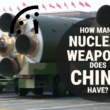On Korean Peninsula, “pragmatic steps toward ideal objectives”
By Shen Dingli, August 3, 2016
"Pragmatic steps toward ideal objectives"—that was the motto of Henry L. Stimson, prominent US statesman of an earlier era. On the Korean Peninsula, eliminating nuclear weapons is an ideal objective. But reaching this objective poses severe obstacles, such as the isolationist and rather surreal nature of the North Korean regime, which guarantees there will be no domestic drive to denuclearize (at least not for now). Meanwhile, interactions between Pyongyang on the one hand, and Washington and Seoul on the other, have too often managed only to harm prospects for disarmament.
But this doesn't mean that one should surrender to despair. Rather, in accordance with Stimson's motto, a pragmatic approach might lead down brighter avenues.
Whether Pyongyang possesses nuclear weapons or not, other nations have to peacefully coexist with North Korea—just as, in the 1950s, China coexisted with the United States even though Washington occasionally issued nuclear threats or bluffs against Beijing. China had no choice but to live under the shadow of US nuclear weapons. It handled the threats sensibly and rode out the difficult times until it had built its own atom bomb—and even then it exercised restraint by establishing a policy of minimum deterrence. Later, Beijing normalized relations with Washington, putting aside for the time being the thorny issue of US weapons sales to Taiwan.
Likewise, because Washington had decided not to launch a military strike against Beijing's nascent nuclear weapons program, the United States had to accept the reality of a nuclear China. Eventually, China joined the Nuclear Non-Proliferation Treaty and became a responsible nuclear stakeholder, and Washington has managed to live peacefully with a nuclear China for more than half a century now.
China, the United States, and India don't necessarily accept the legitimacy of one another's nuclear deterrents, but they all manage to live with the reality of those deterrents. Since none of the three countries has the military ability to deny nuclear weapons to the others, each country endeavors to shape the others into responsible nuclear stakeholders.
The same logic should apply to North Korea. No country accepts Pyongyang's nuclear weapons on a political level. But the international community lacks a viable military means of eliminating the North's nuclear wherewithal. This leaves no choice but peaceful coexistence with Pyongyang.
"Peaceful coexistence" doesn't mean simply accepting whatever North Korea does. Rather, nations should take any possible action to shape Pyongyang's behavior—to encourage the North to behave more sensibly and responsibly. Whenever Pyongyang takes a reasonable step, such as its recent adoption of a limited no-first-use nuclear policy, the rest of the world should react positively. To be sure, North Korea probably modified its doctrine mainly to earn international acceptance of its nuclear weapon status, but stating an intention to use nuclear weapons responsibly still deserves commendation.
In July, the North announced a package of five preconditions for its participation in denuclearization. The United States and South Korea expressed no interest in embracing this "propaganda" from Pyongyang—and admittedly, some of the conditions do seem difficult to accept right now, especially the demand that US troops be withdrawn from the South. But, as argued by my roundtable colleague Chung-in Moon, not all of Pyongyang's conditions seem impossible to meet.
The North demanded, for example, that the United States neither attack nor intimidate the North with nuclear weapons. A demand of this sort could easily be an element of negotiations, as the United States has essentially no need to launch a preemptive nuclear attack against the North. In any event, the Obama administration is reportedly reviewing the viability of converting Washington's conditional nuclear no-first-use policy into an unconditional policy.
If the United States and South Korea keep in mind Stimson's motto, nothing prevents them from discussing at least some of Pyongyang's demands. And though total nuclear disarmament on the peninsula might be unrealistic in the short term, easing tensions and encouraging nuclear restraint are useful in themselves. Incremental nuclear disarmament (or at least nuclear arms control) is a pragmatic starting point for eventual denuclearization.
Political mistrust underlies every barrier to denuclearization on the peninsula. All parties should therefore pursue opportunities to enhance trust—rather than searching for reasons to do nothing. Pyongyang's nuclear program won't disappear by itself. Only constructive partnership can remove it.
Topics: Nuclear Weapons
Share: [addthis tool="addthis_inline_share_toolbox"]














